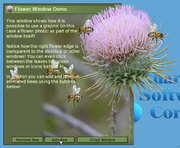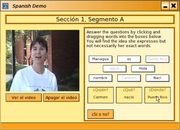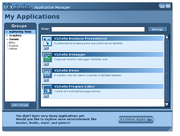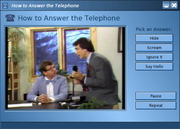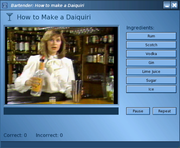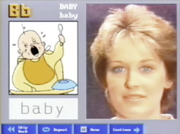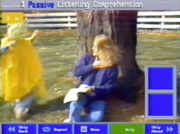Difference between revisions of "V∆Delta Overview"
(→Using The Tutorials) |
(→What Can VΔDelta Do For Me?) |
||
| (5 intermediate revisions by 2 users not shown) | |||
| Line 37: | Line 37: | ||
==What Can VΔDelta Do For Me?== | ==What Can VΔDelta Do For Me?== | ||
===Artists=== | ===Artists=== | ||
| − | Artists, photographers and other creative minds can now have sophisticated online galleries of their work, without paying for a programmer to assist them. These galleries can include customized searching and sorting, panning and/or zooming, and even show step-by-step how an image was created. | + | Artists, photographers and other creative minds can now have sophisticated online galleries of their work, without paying for a programmer to assist them. These galleries can include customized searching and sorting, panning and/or zooming, and even show step-by-step how an image was created. For more details see [[Tutorial:Overview for Graphic Artists]]. |
[[File:2011-08 Bartender.png|thumb|right|How to Make a Daiquiri interactive video demonstration circa 1986.]] | [[File:2011-08 Bartender.png|thumb|right|How to Make a Daiquiri interactive video demonstration circa 1986.]] | ||
| Line 45: | Line 45: | ||
===Clubs and Organizations=== | ===Clubs and Organizations=== | ||
| − | A big problem with current organization and club sites is that members, even the people who are running the organization, can't get on the site and update it themselves. This means that information on the sites is often not timely and is stale and out-of-date. With VΔDelta, this problem no longer exists. Calendars, member specials, and anything else can be changed at the drop of a hat. In addition, it is easier to create a community in which members can connect with each other - across town or across the globe. | + | A big problem with current organization and club sites is that members, even the people who are running the organization, can't get on the site and update it themselves. This means that information on the sites is often not timely and is stale and out-of-date. With VΔDelta, this problem no longer exists. Calendars, member specials, and anything else can be changed at the drop of a hat. In addition, it is easier to create a community in which members can connect with each other - across town or across the globe. For more details see [[Tutorial:Overview for Clubs & Groups]]. |
===Engineers=== | ===Engineers=== | ||
| Line 55: | Line 55: | ||
===Personal Internet Users=== | ===Personal Internet Users=== | ||
With VΔDelta everyone can create personal Internet sites and even their own online businesses. They can lay out their sites without any complex technical know-how or training and be assured their sites will look exactly the same on everyone else's screen - no matter what operating system the visitor is using. | With VΔDelta everyone can create personal Internet sites and even their own online businesses. They can lay out their sites without any complex technical know-how or training and be assured their sites will look exactly the same on everyone else's screen - no matter what operating system the visitor is using. | ||
| − | [[File:2011-08 Listening Comprehension.png|thumb|right|Listening comprehension exercise from the ESL prototype, 1988.]] | + | [[File:2011-08 Listening Comprehension.png|thumb|right|Listening comprehension exercise from the ESL prototype, 1988.]] For more details see [[Tutorial:Overview for Personal/Home Users]]. |
===Programmers=== | ===Programmers=== | ||
| − | No restrictions and great stability! With VΔDelta's innovative technology, programmers can focus on the design, features, and functionality of their programs without the worries of cross-platform compatibility, operating system bugs, etc. Plus, with VΔDelta's easy-to-learn language, on-demand-delivery of code, superior debugging and error handling, modular delivery, Unicode support, video support, audio support, and multi-threading anything is possible! | + | No restrictions and great stability! With VΔDelta's innovative technology, programmers can focus on the design, features, and functionality of their programs without the worries of cross-platform compatibility, operating system bugs, etc. Plus, with VΔDelta's easy-to-learn language, on-demand-delivery of code, superior debugging and error handling, modular delivery, Unicode support, video support, audio support, and multi-threading anything is possible! For more details see [[Tutorial:Overview for Experienced Programmers]]. |
===School & Curriculum management=== | ===School & Curriculum management=== | ||
| Line 66: | Line 66: | ||
===Students=== | ===Students=== | ||
VΔDelta is simple for students of all ages to use, enabling students to create presentations incorporating audio, video, graphics, and animation. They can also create their own study groups, lessons, and games. | VΔDelta is simple for students of all ages to use, enabling students to create presentations incorporating audio, video, graphics, and animation. They can also create their own study groups, lessons, and games. | ||
| + | For more details see [[Tutorial:Overview for Students]]. | ||
===Teachers=== | ===Teachers=== | ||
VΔDelta has an easy learning curve, enabling teachers to write interactive content themselves, without going through an intermediate programmer. Now teachers can easily create interactive online lessons for their students and even create businesses to sell their courses to teachers in other schools. | VΔDelta has an easy learning curve, enabling teachers to write interactive content themselves, without going through an intermediate programmer. Now teachers can easily create interactive online lessons for their students and even create businesses to sell their courses to teachers in other schools. | ||
| + | For more details see [[Tutorial:Overview for Teachers]]. | ||
| − | == | + | ==The History of VΔDelta== |
| − | + | ||
| − | + | The history behind V∆Delta goes all the way back to the PLATO System started in the 1960s with a $28 million dollar National Science Foundation grant to the University of Illinois. V∆Delta syntax is loosely based on the PLATO system. | |
| − | + | ||
| − | + | *In 1978 Computer Teaching Corporation moved PLATO from the mainframe computer to the micro computer and called the language TenCORE. | |
| + | *In 1998 Catharon modified TenCORE for modular delivery on the Internet to prove the concept of our first patent. | ||
| + | *The rewrite of completely new code for V∆Delta started in 2002 to incorporate our Multi-threading patent concepts. | ||
| + | |||
| + | The motivation for V∆Delta started in 1988 when Catharon began development of a total immersion training program for English as a Second Language. This highly interactive program used full-motion video. But with each release of Windows there was a major change to the operating system platform that kept breaking the software. This started us towards a goal of developing a programming system with true platform independence. | ||
| + | |||
| + | ==Mission Statement== | ||
| + | |||
| + | It is our mission to provide tools to empower ordinary people to use computers and the Internet to build businesses, to build global community and cross-cultural understanding, and to provide equal opportunity for education to the millions of people disenfranchised by poverty and geographic isolation. | ||
| + | |||
| + | *We are dedicated to making computer technology available at an affordable and fair price. | ||
| + | *We are dedicated to making computer technology easy to learn for all people. | ||
| + | *We are dedicated to stamping out the proliferating bugs that make computers crash, that obsolesce applications, and that prevent interoperability of applications. | ||
| + | *We are dedicated to creating community by enabling people to work together and play together, to easily share skills and resources, and exchange ideas. | ||
| + | |||
| + | ==Credits== | ||
| + | For information on our management team and developers please see the '''[[Credits]]''' page. | ||
== Where Next? == | == Where Next? == | ||
| − | |||
| − | If you' | + | To see what some V∆Delta code actually looks like and to begin learning how to use it, please see the [[V∆Delta Tutorial | V∆Delta Tutorial]]. |
| + | |||
| + | If you are an '''experienced programmer,''' and would like more technical details, you may wish to see the [[Experienced Programmers Overview (Tutorial) | Overview for Experienced Programmers]] | ||
Latest revision as of 08:48, January 15, 2013
Contents |
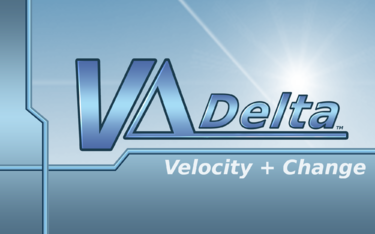
[edit] What is a Computer Language?
As the name implies, a computer language (or programming language) is simply a language designed for communicating with computers. People use computer languages to write instructions that tell computers how to do all the various things they do, from calculating the square root of a number to surfing the Web. If you go to check your e-mail or launch a game on your smartphone, you are running a computer application that is made possible by instructions written in a computer language.
Like English or any other language, each computer language has its own unique vocabulary, symbols, grammar, and syntax, which must be learned before the language can be used effectively. Unfortunately, most fully functional computer languages are pretty complex, and many require years of training. The result is that a great deal of time and energy must be invested in mastering the technical aspects of programming, making application development impractical for most non-programmers.
[edit] What Makes V∆Delta Different?
- VΔDelta code is easy to understand and use. Conventional programming languages can be difficult to understand, and many require you to spend months or even years learning long lists of cryptic symbols and obscure command names. In contrast, VΔDelta code is similar to plain English and has a built-in structure that makes it easy to begin using right away, whether you are an experienced programmer or a complete beginner.
- The VΔDelta layout editor allows you to create programs without writing code. As simple as VΔDelta code is to write, putting your applications together becomes even easier with the layout editor. In the layout editor, you can use an intuitive graphic interface to drag and drop buttons, arrange and resize graphics, and construct whole programs without having to write a single line of code.
- VΔDelta is designed for content creation. Because VΔDelta makes the technical side of application development so easy, you can focus on the creative aspects of your programs, rather than spending hours wrestling with complex coding syntax. This combination of ease of use and a focus on content creation makes VΔDelta the programming language for everyone, from teachers and artists to engineers and scientists. With VΔDelta, you can focus on what it is you want to create, rather than worrying about how you’re going to create it.
- VΔDelta is a full-fledged programming language. Some computer languages sacrifice power and flexibility for the sake of simplicity and ease of use. VΔDelta incorporates the best of both worlds, being both one of the easiest languages to learn and, simultaneously, containing all the features and power of a full-fledged programming language. In fact, as we’ll see shortly, VΔDelta even incorporates two patented features that aren’t seen in any other languages currently available.
- VΔDelta is platform independent. In most languages, programs have to be written for a specific operating system. This means that if you design your application to run on Windows, you’ll then have to write a second version of it if you also want it to work on Mac OSX, Linux, or any of the other operating systems that are out there. In contrast, VΔDelta is a fully interpreted language. This means you only need to create your program once, and VΔDelta will automatically translate it for whatever platform it’s running on, saving you time and money, and making your program available to a wider audience.
- VΔDelta is forward-compatible. It often happens that when a new version of an operating system is released, programs created for older systems stop running. In practical terms, this means that if you want your program to keep running throughout the years, you will have to update or even re-write it multiple times. Programs written for Windows 3.1 or Mac OS 9, for example, may not run properly on Windows 7 or Mac OSX. Applications developed in VΔDelta, on the other hand, have forward compatibility, meaning that older VΔDelta programs continue to run no matter how many times the operating system has been updated.
- VΔDelta uses patented modular delivery. VΔDelta programs are unique in that they are separated into many small parts (or modules). This means that, when an application is accessed over the Internet, it can begin running as soon as the necessary modules have been downloaded. This eliminates long download times and, because you only download the parts of the program you need, can also save you hard disk space. In addition, VΔDelta’s modular structure helps distribute traffic load between multiple servers without the user seeing any degradation in performance.
- VΔDelta has patented multi-threading capability. VΔDelta supports true multi-threading, letting you create unique objects that respond instantly to user input (i.e. there is never any lag when you click a button or drag a scrollbar) and allowing VΔDelta programs to communicate easily across the Internet.
Unlike any other language, VΔDelta can multi-thread even on processors or operating systems that do not support multi-threading or that place a limit on the number of concurrent threads. VΔDelta will also take advantage of a multi-threading processor if one is present, and it will allow the application to run more concurrent threads than the hardware supports. In contrast, Java, C/C++, and Pascal will not multi-thread unless both the hardware and the operating system support it.
Using multi-threading, it is simple to create true program objects. Because the system can run very large numbers of threads without performance degradation it becomes practical to create threads for every object, including those used for the graphic user interface.
- Superior Debugging and Error Handling: All VΔDelta error messages include full and clear error information. A VΔDelta application can even trap errors and handle them itself while running. Applications can also email their developers when bugs occur, and the developer can correct the bug real-time - without the user even needing to restart the program! In addition, VΔDelta provides advanced debugging tools to assist developers.
For more technical details on these areas please see the Overview for Experienced Programmers.
[edit] What Can VΔDelta Do For Me?
[edit] Artists
Artists, photographers and other creative minds can now have sophisticated online galleries of their work, without paying for a programmer to assist them. These galleries can include customized searching and sorting, panning and/or zooming, and even show step-by-step how an image was created. For more details see Tutorial:Overview for Graphic Artists.
[edit] Businesses
Businesses can now have a presence on the Internet at a fraction of the usual cost, creating their own interactive catalogs and sites which can easily be updated without the assistance of any outside services. For example, a restaurant manager could post the specials every day in just a few minutes.
[edit] Clubs and Organizations
A big problem with current organization and club sites is that members, even the people who are running the organization, can't get on the site and update it themselves. This means that information on the sites is often not timely and is stale and out-of-date. With VΔDelta, this problem no longer exists. Calendars, member specials, and anything else can be changed at the drop of a hat. In addition, it is easier to create a community in which members can connect with each other - across town or across the globe. For more details see Tutorial:Overview for Clubs & Groups.
[edit] Engineers
VΔDelta offers advanced features, while maintaining a simple and stable interface. Our advanced feature set includes multi-threading and socket support. This allows for easy writing of programs as remote controls. For example, a chemical plant in Illinois could be operated by remote control from a location in Ohio.
[edit] International Users
VΔDelta includes full Unicode support! This means that with VΔDelta you don't have to download special language support to display characters in other languages. All 64,000 characters of the world's languages can be displayed without special support - from Cherokee to Arabic to Gujurati.
[edit] Personal Internet Users
With VΔDelta everyone can create personal Internet sites and even their own online businesses. They can lay out their sites without any complex technical know-how or training and be assured their sites will look exactly the same on everyone else's screen - no matter what operating system the visitor is using.
For more details see Tutorial:Overview for Personal/Home Users.[edit] Programmers
No restrictions and great stability! With VΔDelta's innovative technology, programmers can focus on the design, features, and functionality of their programs without the worries of cross-platform compatibility, operating system bugs, etc. Plus, with VΔDelta's easy-to-learn language, on-demand-delivery of code, superior debugging and error handling, modular delivery, Unicode support, video support, audio support, and multi-threading anything is possible! For more details see Tutorial:Overview for Experienced Programmers.
[edit] School & Curriculum management
Easily automate curriculum management, report cards, and more. Create online school communities that bring students, teachers, and parents together. These communities can include secured areas available only to administrators and/or only to teachers.
[edit] Students
VΔDelta is simple for students of all ages to use, enabling students to create presentations incorporating audio, video, graphics, and animation. They can also create their own study groups, lessons, and games. For more details see Tutorial:Overview for Students.
[edit] Teachers
VΔDelta has an easy learning curve, enabling teachers to write interactive content themselves, without going through an intermediate programmer. Now teachers can easily create interactive online lessons for their students and even create businesses to sell their courses to teachers in other schools. For more details see Tutorial:Overview for Teachers.
[edit] The History of VΔDelta
The history behind V∆Delta goes all the way back to the PLATO System started in the 1960s with a $28 million dollar National Science Foundation grant to the University of Illinois. V∆Delta syntax is loosely based on the PLATO system.
- In 1978 Computer Teaching Corporation moved PLATO from the mainframe computer to the micro computer and called the language TenCORE.
- In 1998 Catharon modified TenCORE for modular delivery on the Internet to prove the concept of our first patent.
- The rewrite of completely new code for V∆Delta started in 2002 to incorporate our Multi-threading patent concepts.
The motivation for V∆Delta started in 1988 when Catharon began development of a total immersion training program for English as a Second Language. This highly interactive program used full-motion video. But with each release of Windows there was a major change to the operating system platform that kept breaking the software. This started us towards a goal of developing a programming system with true platform independence.
[edit] Mission Statement
It is our mission to provide tools to empower ordinary people to use computers and the Internet to build businesses, to build global community and cross-cultural understanding, and to provide equal opportunity for education to the millions of people disenfranchised by poverty and geographic isolation.
- We are dedicated to making computer technology available at an affordable and fair price.
- We are dedicated to making computer technology easy to learn for all people.
- We are dedicated to stamping out the proliferating bugs that make computers crash, that obsolesce applications, and that prevent interoperability of applications.
- We are dedicated to creating community by enabling people to work together and play together, to easily share skills and resources, and exchange ideas.
[edit] Credits
For information on our management team and developers please see the Credits page.
[edit] Where Next?
To see what some V∆Delta code actually looks like and to begin learning how to use it, please see the V∆Delta Tutorial.
If you are an experienced programmer, and would like more technical details, you may wish to see the Overview for Experienced Programmers
